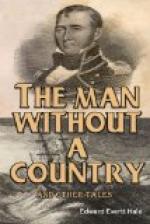“Mr. Sisson,” said he, “if the Confederacy had lived, I would have died before I ever told what became of that order of yours. But now I have no secrets, I believe, and I care for nothing. I do not know now how it happened. We knew it was an extra nice job. And we had it on an elegant little new French Fourdrinier, which cost us more than we shall ever pay. The pretty thing ran like oil the day before. That day, I thought all the devils were in it. The more power we put on the more the rollers screamed; and the less we put on, the more sulkily the jade stopped. I tried it myself every way; back current; I tried; forward current; high feed; low freed, I tried it on old stock, I tried it on new; and, Mr. Sisson, I would have made better paper in a coffee-mill! We drained off every drop of water. We washed the tubs free from size. Then my brother, there, worked all night with the machinists, taking down the frame and the rollers. You would not believe it, sir, but that little bit of wire,”—and he took out of his pocket a piece of this hateful steel, which poor I knew so well by this time,—“that little bit of wire had passed in from some hoop-skirt, passed the pickers, passed the screens, through all the troughs, up and down through what we call the lacerators, and had got itself wrought in, where, if you know a Fourdrinier machine, you may have noticed a brass ring riveted to the cross-bar, and there this cursed little knife—for you see it was a knife, by that time—had been cutting to pieces the endless wire web every time the machine was started. You lost your bonds, Mr. Sisson, because some Yankee woman cheated one of my rag-men.”
On that story I came up stairs. Poor Aunt Eunice! She was the reason I got no salary on the 1st of April. I thought I would warn other women by writing down the story.
That fatal present of mine, in those harmless hour-glass parcels, was the ruin of the Confederate navy, army, ordnance, and treasury; and it led to the capture of the poor President too.
But, Heaven be praised, no one shall say that my office did not do its duty!
CHRISTMAS WAITS IN BOSTON.
FROM THE INGHAM PAPERS.
[When my friends of the Boston Daily Advertiser asked me last year to contribute to their Christmas number, I was very glad to recall this scrap of Mr. Ingham’s memoirs.
For in most modern Christmas stories I have observed that the rich wake up of a sudden to befriend the poor, and that the moral is educed from such compassion. The incidents in this story show, what all life shows, that the poor befriend the rich as truly as the rich the poor: that, in the Christian life, each needs all.
I have been asked a dozen times how far the story is true. Of course no such series of incidents has ever taken place in this order in four or five hours. But there is nothing told here which has not parallels perfectly fair in my experience or in that of any working minister.]




